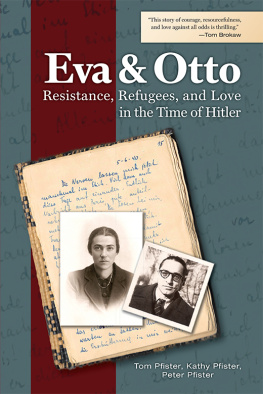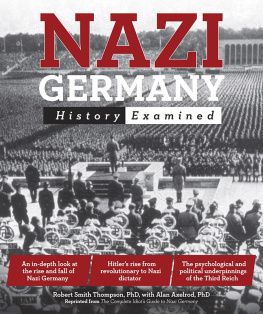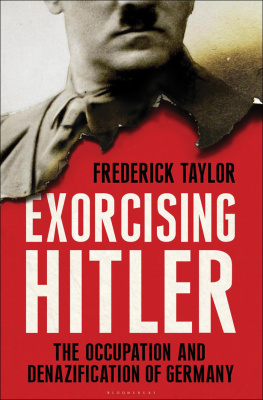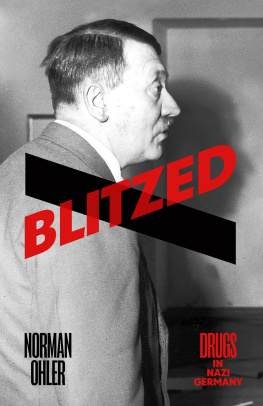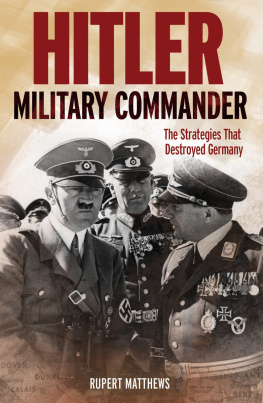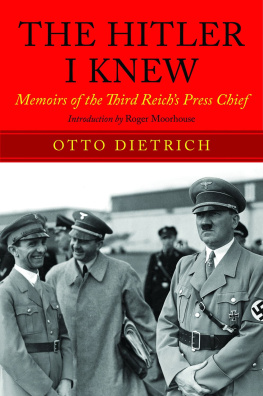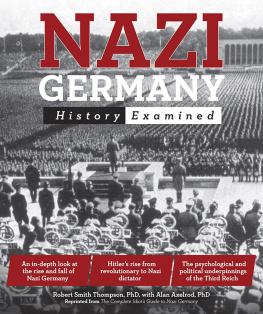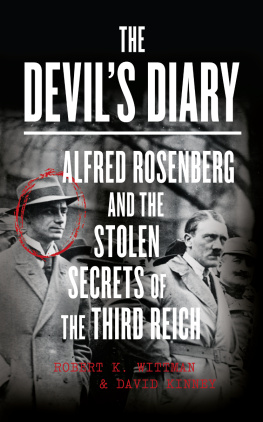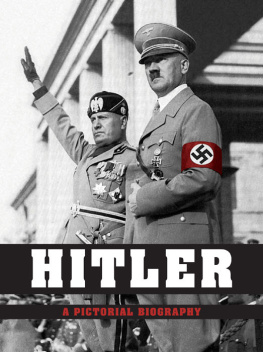The True German
The Diary of a
World War II
Military Judge
Werner Otto Mller-Hill
Introduction by
Benjamin Carter Hett
Translated and with Additional Editing by Jefferson Chase


THE TRUE GERMAN
Copyright Michalon Editeur, 2011.
English-language translation copyright 2013 by Jefferson Chase.
All rights reserved.
First published in France as Journal de Guerre dun Juge Militaire Allemande 19441945 by Michalon Editeur.
First published in English in 2013 by PALGRAVE MACMILLAN in the USa division of St. Martins Press LLC, 175 Fifth Avenue, New York, NY 10010.
Where this book is distributed in the UK, Europe and the rest of the world, this is by Palgrave Macmillan, a division of Macmillan Publishers Limited, registered in England, company number 785998, of Houndmills, Basingstoke, Hampshire RG21 6XS.
Palgrave Macmillan is the global academic imprint of the above companies and has companies and representatives throughout the world.
Palgrave and Macmillan are registered trademarks in the United States, the United Kingdom, Europe and other countries.
All photographs and images come from the original diary or the Mller-Hill family.
ISBN-13: 978-1-137-27854-8
Library of Congress Cataloging-in-Publication Data is available from the Library of Congress.
A catalogue record of the book is available from the British Library.
Design by Letra Libre, Inc.
First edition: September 2013
10 9 8 7 6 5 4 3 2 1
Printed in the United States of America
Contents
A Note on the Text
W erner Otto Mller-Hills diary is published with the kind permission of his son Benno Mller-Hill. Born in 1933, he can be seen at the age of four in the family photos in this volume. Not only is Benno Mller-Hill one of Germanys leading biochemists and geneticists, but he has also made important contributions to the field of bioethics, in particular on the subject of the natural sciences under National Socialism. He lives in Cologne.
Translators Note
A s I discovered while working on the diary kept by Werner Otto Mller-Hill in the final years of World War II, there is a big difference between translating a work of history and translating a historical source. With the former, the translator tries to remedy weak spots in the original and adapt the work so that it can have maximum impact on its new foreign audience. With the latter, the emphasis must be on staying close the original so the past can speak as directlynot as elegantlyas possible to the audience. In this spirit, my translation of Mller-Hills diary is very much warts and all.
Mller-Hill was a judge, not a professional author. Although he writes fairly clear prose for the time, his style reflects his era and is a bit long-winded, hair-splitting, even prissy by todays standards. Ive made no effort to smooth over stylistic infelicities, cut out repetitions, or tighten up arguments. If we take Mller-Hill at his word, he kept this diary as record of what he thought and felt for his son, not because he knew he was going to be published someday, and todays readers should keep that in mind.
Nor should we expect the opinions he expresses in these pages to conform to our notions of consistency or acceptability. Mller-Hill realized the Third Reich was waging an ignominious and unwinnable war and exercised leniency as a judge in cases that a fervent ideologue would have treated harshly. However, his opposition to Nazism was born of his German patriotism. First and foremost, he despised Hitler and his henchmen for what they did to Germany, not for what they did to Europe or Europes Jews. He acknowledged that Germans had perpetrated an abominable injustice upon Jews without expressing the sort of empathy we would now demand for people treated so gruesomely. At one point he even raged at the thought of (presumably American) Negroes destroying the venerable, cultured city of Strasbourg. I havent sought to tone down such passages or make them acceptable to contemporary sensibilities. Whats striking about the historical figure and document we encounter here are precisely such contradictions. Mller-Hill was no Oskar Schindler or Claus von Stauffenberg, but I suspect that if we could ask even these undeniably courageous men what they thought about Jews, people of color, or the working classes today, we also would find some of their answers shocking.
One running theme I found interesting and somewhat unexpected is the importance placed on regional identity. Mller-Hill was a native and lifelong resident of Freiburg. Residents of the southwestern corner of Germany, where the country comes together with France and Switzerland, speak in strong dialect and pride themselves on Alemannic customs and an Alemannic mindset not found anywhere else in Germany. Together with rest of Alsace-Lorraine, the city of Strasbourg, where Mller-Hill was stationed as he began his diary, had been part of Germany from 1870 to 1918. Freiburg and Strasbourg are only 53 miles from one another. Thus, its perhaps understandable that Mller-Hill did not see himself as an occupying foreign invader. His sense of local Alemannic identity also led him to associate many aspects of Nazism he most detested with Prussia in northeastern Germanywhich runs contrary to the historical facts that the Nazi movement began in southern Germany and initially had trouble bringing some segments of the Prussian bureaucracy into line. Again I felt it was my task as a translator to let Mller-Hill speak for himself, even when I thought he was wrong.
Unlike a work of history, a historical document doesnt have to be right to be worth reading. In terms of perspicacity and analytic insight, Mller-Hills diary may not compare very well to those written by Victor Klemperer. Klemperer, though, was an academic forced into an extreme outsider position that encouraged an extraordinary clarity of vision. Mller-Hill was an upper-middle-class member of the social mainstream who internally rejected the positions of a government he came to abhor, and refused, where he felt he could, to put them into practice. Much has been written on the phenomenon of inner emigration in Nazi Germany and other dictatorships and totalitarian systems. Mller-Hills diary is an example of this idea, which is slippery and self-serving. After World War II, it was easy for Germans to claim that, in their heart of hearts, theyd opposed the Hitler regime. Such assertions could neither be proven nor disproven. Mller-Hill put his highly critical opinions down on paper, and for that reason alone, what he wrote merits attention.
Finally, I was also struck by the fact that, although Mller-Hill felt nothing but contempt for his Nazi superiors and performed his job contrary to the spirit of his instructions, he still tried to keep functioning within the system for as long as he could. One of the most difficult things to understand about Germans behavior in the final weeks and months of World War II is why so many carried on even though the battle was obviously lost, and continued resistance meant courting even greater disaster. It is very difficult to wish for or choose defeat for ones own kind. Many Americans, for instance, opposed the Second Iraq War. But how many of them rooted for the United States to fail? Mller-Hills diary is shot through with a similar ambiguity, perhaps contradiction. By not resolving the inconsistencies, Ive tried to give readers access not just to a bygone time, but to a fundamentally human disconnect between attitudes and behavior. Works of history are supposed to be logical, consistent and thoroughly reasoned out. Historical materialour most direct immediate source of how people acted in the pastis anything but those things.
Next page

